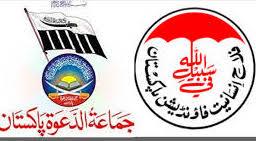Clipping the Wings of Lashkar-e Taiba and its Charity Front Jamaat-ud Dawa of Pakistan
In an attempt to clip Pakistan’s terror charity Jamaat ud Dawa’s (JuD) financial wings further, the U.S. Department of the Treasury on 25 June (2014 once again targeted the leadership and financial networks of the organization. The JuD (formerly Markaz Dawat-ul-Irshad-MDI) which is a social charily front for the deadly Jihad group Lashkar-e-Taiba (LeT) has been operating with impunity inside Pakistan since its inception. The group was founded by Hafiz Muhammad Saeed, the present chief of JuD and all its franchises and Zafar Iqbal in Afghanistan’s Kunar province in 1987 under the active guidance of Abdullah Azzam, the Palestinian Islamic ideologue who mentored Osama bin Laden. LeT has its headquarters in Muridke (Moreedkey) town, located near Lahore, Pakistan and operates training camps in Pakistan-administered Kashmir and some parts of Punjab province and presently expanded into Sind and Balochistan provinces of Pakistan and Bordering areas of neighbouring Afghanistan.
LeT has perpetrated numerous terrorist attacks against India including the November 2008 Mumbai serial attacks. The group aims to establish Nizam-e-Mustafa (God’s government) in the world and merge of Muslim majority Jammu & Kashmir (J&K) state with Pakistan. It has called for a holy war against the United States, India and Israel. With active support from Pakistan’s external intelligence agency ISI, the Lashkar-e Taiba furthers its anti-India objectives introducing suicide missions in Jammu and Kashmir and into the heartlands of India over the years. The JuD/LeT combine often compared with al Qaeda for its lethality and sometimes with Hezbollah and Hamas, for its militancy-cum-charity activities. Most recently Jamaat Ud Dawa morphed into a political pressure group in Pakistan.
With active and sustained State patronage and to become legitimate in the eyes of the international community, Hafiz Saeed and his cohorts have branched out to charitable works during natural calamities. Religious activism remains its focal point. The JuD/ LeT runs many Islamic centres, schools and religious seminaries, a network of hospitals, orphanages, and charity centres along with thousands of administrative and fund collection centres across Pakistan. After a brief government crackdown under international pressure, the JuD has reorganized itself under many umbrella conglomerates e.g. the Tehrik-e-Hurmat-e-Rasool (THR-Movement for Defending the Honor of the Prophet), Tehrik-e-Tahafuz Qibla Awal (TTQA) and Al-Anfal Trust. To evade government proscription and international scrutiny, JuD established many charity fronts e.g. Idara Khidmat-e-Khalq (IKK) and Falah-e-Insaniyat Foundation (FIF). Rightly observed that Lashkar e Taiba /JuD combine has successfully blended militancy with charity works in Pakistan and neighbourhoods (e.g. Maldives/Lanka) through many shadow originations to dodge crackdown and international scrutiny.
So far, the US Treasury and the Department of State have designated 22 individuals and four entities associated with Lashkar-e Taiba and JuD.
The US government for the first time included LeT in the Terrorist Exclusion List on December 5, 2001, and designated as a FTO (Foreign Terrorist Organization) on December 26, 2001. In April 2006, The US State Department added Jamaat-ud-Dawa (JUD) and IKK as aliases of Lashkar- e- Taiba under Executive Order 13224, which blocked all property, and interests in property of JUD and IKK that are in the United States, or come within the United States, or the under the control of U.S. persons. In May 2008, the US state department imposed sanctions (including the freezing of assets) of four senior ideologues and financiers of JuD/LeT including Hafiz Saeed, Zaki-ur-Rehman Lakhvi, Haji Muhammad Ashraf and Mahmoud Ahmed Bahaziq. In November 2010, the US designated the Falah-e-Insaniyat Foundation and a couple of leaders associated with the foundation, Hafiz Abdur Rauf, Mian Abdullah and Mohammad Naushad Alam Khan, to its list of specially designated global terrorists (SDGT).
Again in September 2011, the U.S. Treasury designated two more LeT/JuD leaders, Zafar Iqbal and Hafiz Abdul Salam Bhuttavi.
In Late August 2012, the US Treasury designated another eight LeT/JuD leaders including Abdullah Muntazir, Ahmed Yaqub, Sajid Mir, Hafiz Khalid Walid, Qari Muhammad Yaqoob Sheikh and Talha Saeed.
On June 25 (2014) the department again designated Nazir Ahmad Chaudhry and Muhammad Hussein Gill as Specially Designated Global Terrorists.
LeT is listed as a banned organization in India, Pakistan, the US, Canada, the United Kingdom, the European Union, Russia and Australia. The United Nations Security Council has already imposed sanctions on Jamaat-ud-Dawa and has declared it as a front group for the LeT. Despite the Pakistan government’s proscription, Jamaat-ud-Dawa (JuD) has stepped up its overt anti-Indian and anti-Western rhetoric and operates freely holding mass rallies across Pakistan as its leaders continue to give provocative speeches in various public forums to fuel Jihadi sentiments and threaten Indian and Western interests in the region.
How far these restrictions will hamper JuD/LeT’s operations will remain to be seen. There would be very minimal impact inside Pakistan as the group uses various informal channels to raise funds and it runs under State patronage. It raises funds during public gatherings in Pakistan mostly from wealthy individuals and inspires people for the cause of Kashmir and Islam. The latest sanctions and designations would delegitimize the causes. Even though US impositions of such financial actions will not make much difference immediately to JuD or its various franchises inside Pakistan, it will certainly make things difficult for them in the long run to operate in the international sphere raising funds and logistics through formal channels, especially the donations come in the name of humanitarian and educational charity. Also, large amounts of donations from the Pakistani Diaspora overseas would be restricted. And last but not least the restrictions will jeopardize their movement (Travel) abroad, especially in the Middle Eastern countries, considered a hub for Islamic charities.
NOTES:
- Treasury Targets Financial Network of Pakistan-Based Terrorist Organization Lashkar-E Tayyiba, (11/24/2010), http://www.treasury.gov/press-center/press-releases/Pages/tg980.aspx.
- Treasury Sanctions Lashkar-e Tayyiba Leaders and Founders (9/28/2011), http://www.treasury.gov/press-center/press-releases/Pages/tg1313.aspx.
- Treasury Sanctions Two Senior Lashkar-E-Tayyiba Network Leaders (6/25/2014), http://www.treasury.gov/press-center/press-releases/pages/jl2440.aspx
- Treasury Designates Lashkar-E Tayyiba Leadership (8/30/2012), http://www.treasury.gov/press-center/press-releases/Pages/tg1694.aspx
